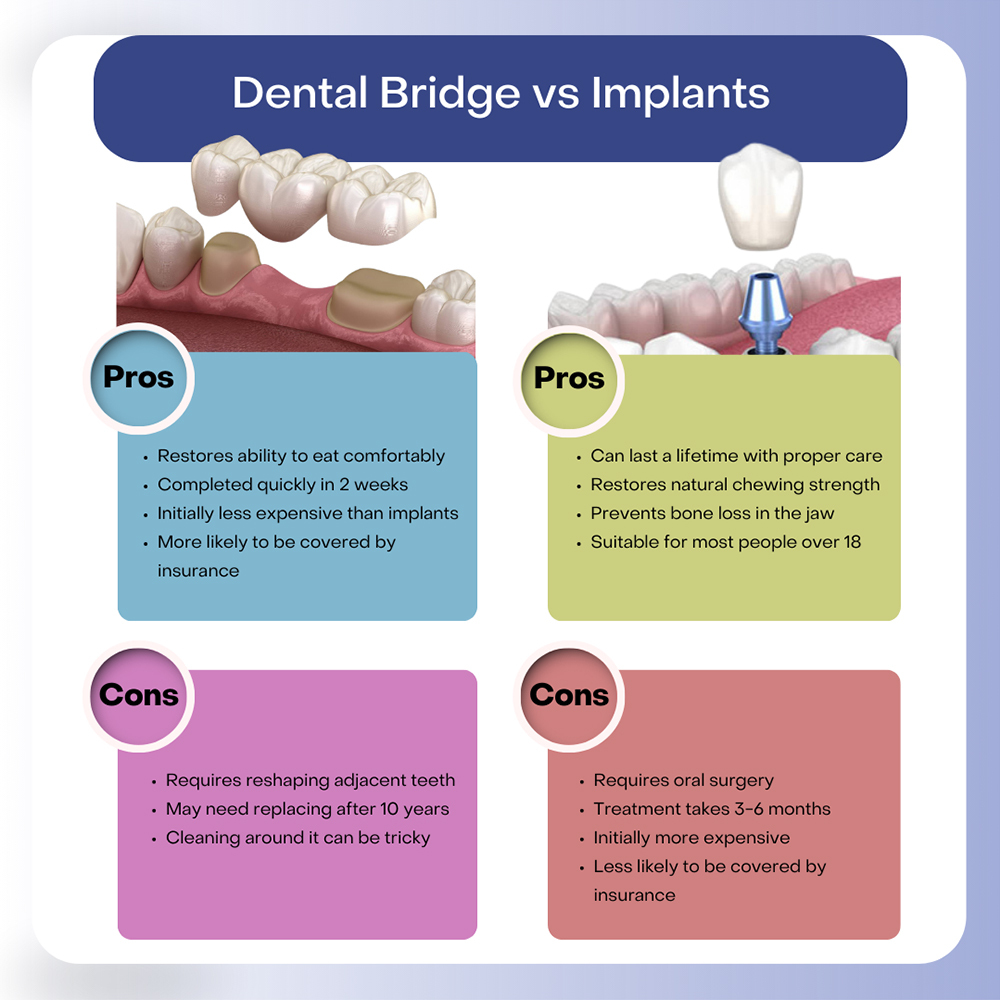Table of contents
Teeth have an extremely rough life. They are regularly exposed to acids and come under extreme pressure every day during biting and chewing. Consequently, it is hardly surprising that most of us will lose one or more teeth as we age.
The problem with losing teeth is that it can affect your ability to talk and eat. Your remaining teeth will drift towards the gaps, destabilizing them and affecting your bite. There is less support for your facial muscles, so your face can begin to collapse inward. These problems can all affect self-esteem.
Two of the most popular ways to replace missing teeth are to have a dental bridge or dental implants. Both treatments work differently, so it’s important to understand how they work to choose the procedure that suits you best.
A dental bridge is a tried and tested solution for tooth loss, filling in the missing tooth or teeth with an artificial restoration called a pontic. The pontic is shaped to look exactly like a real tooth, resting directly on the gum.
The pontic is supported by crowns on either side that fit over the teeth adjacent to the gap. For example, if you are missing a single tooth, both teeth on either side must be crowned, creating a three-tooth or three-unit restoration.
A dental implant is a small screw designed to replace the missing tooth root artificially. It is inserted into the jawbone during a short oral surgery procedure. Once in the jawbone, it soon fuses with the bone, becoming strong and stable enough to support a replacement tooth. A connector is attached to the implant screw, and this holds the implant crown.
Most people will be suitable for either treatment but will most likely prefer a particular approach. Some of the pros and cons of each treatment are outlined below.

Dental bridges have several benefits:
Not everyone wishes to have oral surgery or is suitable, and dental bridges are quicker from start to finish. However, there are some disadvantages:
Some people find cleaning around a dental bridge tricky because the teeth are connected. However, there are special tools to make this task easier, and our hygiene team can demonstrate the right techniques.
Potential benefits of dental implants include:
As you can see, there are some considerable benefits in choosing dental implants; in the long term, they can be more cost-effective. However, they still require proper care and maintenance.
Potential drawbacks of dental implants can include:
There are many factors to consider when deciding between a dental bridge and a dental implant. Although we can provide a lot of information about each treatment, including the cost and how long it will take to complete, it is often a case of individual preference. Some other questions are worth consideration.
Before deciding, here are some questions to think about:
While dental implants may be less convenient to plan and fit and cost more initially, they are the more advanced treatment and are largely considered the gold standard for replacing missing teeth. However, many people have dental bridges and are perfectly happy with this quicker and cheaper solution.
Everyone’s situation is different, but please remember we are here to answer all your questions and discuss each treatment in depth to help you make the right choice.

My name is Victoria Kushensky. I am a general dentist dedicated to remaining at the forefront of my field. Combining compassionate care with extensive knowledge, I offer cosmetic and general dentistry services as well as advanced root canal treatments.
I earned my Doctor of Dental Surgery (DDS) degree from the esteemed New York University College of Dentistry. Throughout my career, I have honed my skills in various dental procedures, ensuring effective treatment for each patient’s unique needs. I prioritize patient comfort and understanding, taking the time to thoroughly explain procedures and address any questions.
More about Dr. KushenskyMy NJ Dentist: Victoria Kushensky, DDS
385 Prospect Ave Suite 304
Hackensack, NJ 07601
(201) 298-8000